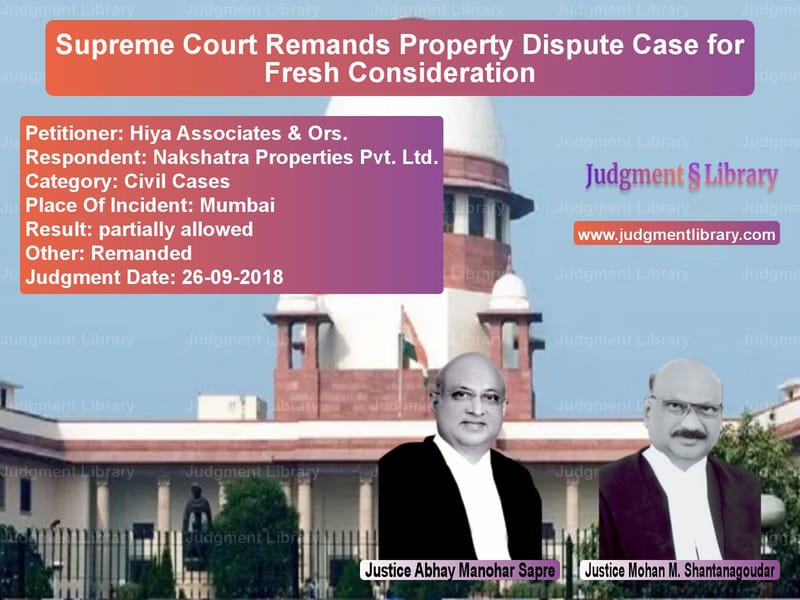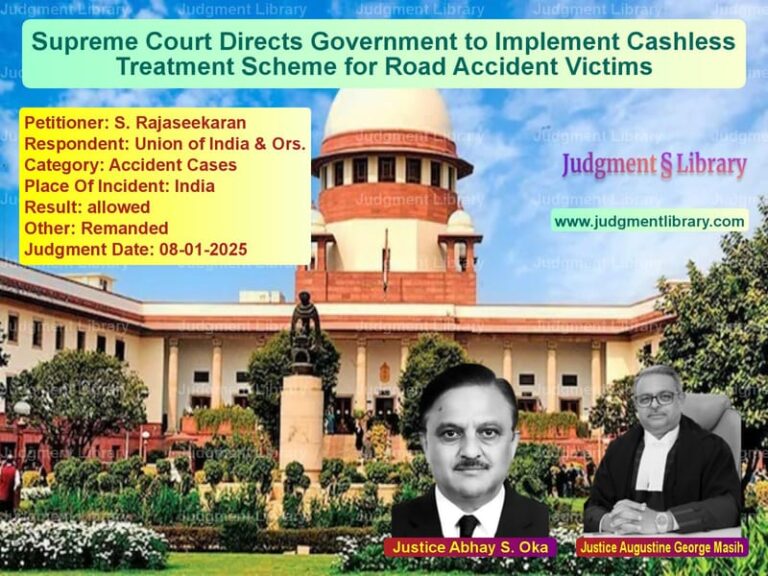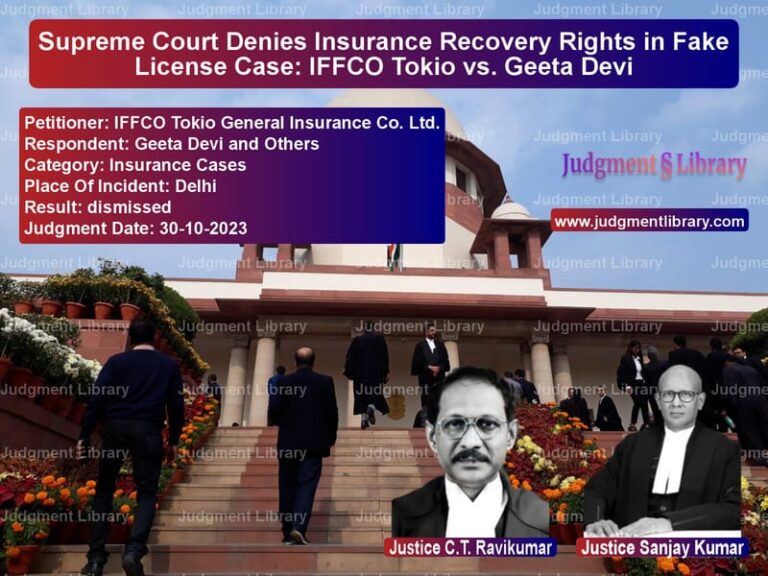Supreme Court Remands Property Dispute Case for Fresh Consideration
The Supreme Court, in its judgment dated September 26, 2018, in the case of Hiya Associates & Ors. vs. Nakshatra Properties Pvt. Ltd., addressed the complexities of an eviction dispute and the execution of a consent decree. The case, which had gone through multiple rounds of litigation, was ultimately remanded back to the Revisionary Court for fresh consideration.
Background of the Case
The dispute originated from an eviction suit filed by Nakshatra Properties Pvt. Ltd. (the respondent) against Hiya Associates & Others (the appellants) in the Small Causes Court at Mumbai. The eviction was sought under Section 16(1)(n) of the Maharashtra Rent Control Act, 1999, citing unauthorized use of the suit premises.
During the pendency of the suit, the parties entered into a compromise and filed consent terms before the court. As per the agreement, the appellants (defendants) agreed to vacate the premises by January 31, 2009, and pay Rs. 5000 per day as mesne profits if they failed to do so.
However, the appellants failed to vacate the property, leading the respondent to file an execution application (No. 31/2013) for enforcing the consent decree.
Key Issues in the Case
- Whether the execution application filed by the respondent was maintainable.
- Whether the consent decree was enforceable under the law.
- Whether the objections raised by the appellants warranted reconsideration by the courts.
Lower Court Decisions
Executing Court’s Decision
The Executing Court, in its order dated October 28, 2015, ruled that:
- The execution application was maintainable.
- The consent decree was enforceable, as the appellants had voluntarily agreed to the terms.
- A warrant of possession was issued against the appellants for failing to vacate the property.
Revisionary Court’s Ruling
The appellants challenged the Executing Court’s decision in the Revisionary Court, which, in its order dated September 26, 2016, ruled:
- The case should be remanded back to the Executing Court for fresh consideration.
- The appellants were allowed to file additional documents (Ex.22) to support their case.
- The execution proceedings should be reconsidered in light of new evidence.
High Court’s Ruling
The respondent (Nakshatra Properties) challenged the Revisionary Court’s ruling in the Bombay High Court, which:
- Set aside the Revisionary Court’s order.
- Restored the Executing Court’s decision.
- Upheld the enforceability of the consent decree.
Supreme Court’s Observations
The appellants approached the Supreme Court, challenging the High Court’s order. The Supreme Court noted that the case had been through multiple levels of litigation and required a fresh evaluation by the Revisionary Court.
1. Improper Remand by the Revisionary Court
The Supreme Court held that the Revisionary Court should have decided the revision on merits instead of remanding the case to the Executing Court.
“The Revisionary Court was under a legal obligation to determine the legality and correctness of the Executing Court’s findings rather than remanding the case.”
2. Additional Documents Not Necessary
The Supreme Court ruled that the additional documents (Ex.22) filed by the appellants in the revision petition were neither relevant nor material to the execution proceedings.
“The executing court had already adjudicated on all objections, and the introduction of new evidence at this stage was unwarranted.”
3. High Court’s Overreach
The Supreme Court found that the High Court should have remanded the case to the Revisionary Court rather than deciding the issue itself.
“The High Court erred in stepping into the role of the Revisionary Court. The proper course was to allow the Revisionary Court to decide the matter afresh.”
Final Judgment
The Supreme Court ruled:
- The appeal was allowed in part.
- The High Court’s order was set aside.
- The Revisionary Court’s order was also set aside.
- The case was remanded back to the Revisionary Court for fresh consideration.
- The Revisionary Court was directed to dispose of the case within six months.
Implications of the Judgment
This ruling has significant implications for property law and execution proceedings:
1. Clarity on Execution of Consent Decrees
The Supreme Court reinforced that consent decrees are legally binding and enforceable.
2. Limits on Remand in Revisionary Jurisdiction
The judgment clarifies that Revisionary Courts should decide cases on merits rather than remanding them unnecessarily.
3. Fairness in Execution Proceedings
The ruling ensures that executing courts follow proper legal procedures while enforcing decrees.
4. Timely Resolution of Disputes
The six-month deadline set by the Supreme Court emphasizes the need for expedited resolution of property disputes.
Conclusion
The Supreme Court’s decision in Hiya Associates & Ors. vs. Nakshatra Properties Pvt. Ltd. provides a clear interpretation of execution laws and emphasizes the importance of due process in enforcing consent decrees. The remand to the Revisionary Court ensures that the case is fairly reconsidered, while also affirming the binding nature of consent decrees. This ruling serves as a precedent for future execution proceedings and underscores the judiciary’s role in ensuring just and timely resolutions.
Petitioner Name: Hiya Associates & Ors..Respondent Name: Nakshatra Properties Pvt. Ltd..Judgment By: Justice Abhay Manohar Sapre, Justice Mohan M. Shantanagoudar.Place Of Incident: Mumbai.Judgment Date: 26-09-2018.
Don’t miss out on the full details! Download the complete judgment in PDF format below and gain valuable insights instantly!
Download Judgment: Hiya Associates & Or vs Nakshatra Properties Supreme Court of India Judgment Dated 26-09-2018.pdf
Direct Downlaod Judgment: Direct downlaod this Judgment
See all petitions in Property Disputes
See all petitions in Landlord-Tenant Disputes
See all petitions in Specific Performance
See all petitions in Judgment by Abhay Manohar Sapre
See all petitions in Judgment by Mohan M. Shantanagoudar
See all petitions in partially allowed
See all petitions in Remanded
See all petitions in supreme court of India judgments September 2018
See all petitions in 2018 judgments
See all posts in Civil Cases Category
See all allowed petitions in Civil Cases Category
See all Dismissed petitions in Civil Cases Category
See all partially allowed petitions in Civil Cases Category







